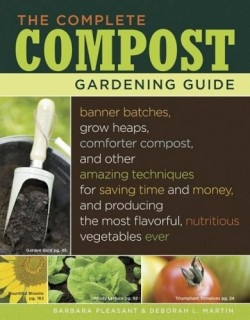The Complete Compost Gardening Guide
Most plants thrive in soil that is rich in humus—decaying organic matter—because humus holds moisture and provides nutrients to plants. According to the authors of The Complete Compost Gardening Guide, the best way to give plants humus is to make your own. This guidebook gives instructions on “gardening in garbage,” and explains how to grow compost piles that double as planting beds for flowers and vegetables.
Pleasant and Martin offer advice on choosing labor-saving sites, working with what’s on hand, helping bacteria do its work, and composting to suit a garden’s needs. Gardeners should treat every plant to some form of compost, the authors write, and blanket beds as they renovate between plantings. Always put soil care first and plants second.
There is advice on preparing the soil for growing legumes, on the tools and materials needed, and on turning garden refuse into “garden rewards.” There also is a list of compost fodder plants grown primarily to be consumed by animals. Ten of these are profiled, including alfalfa, borage, buckwheat, peas, mustard, rye, and wheat.
A chapter describing plants for the garden suggests such vegetables as beans, peas, eggplants, cantaloupes, muskmelons, pumpkins, squash, and watermelons. Data is offered on choosing varieties, days to maturity, and the growing season. There are photographs and drawings on almost every page—all of them in color—a glossary, safety tips, and snippets from the authors’ diaries and journals.
Pleasant and Martin have combined their years of gardening experience thoughtfully and convincingly. Gardening readers will wonder why it took so long to figure out that composting is at the heart of the fruits and flowers.
Reviewed by
George Cohen
Disclosure: This article is not an endorsement, but a review. The publisher of this book provided free copies of the book to have their book reviewed by a professional reviewer. No fee was paid by the publisher for this review. Foreword Reviews only recommends books that we love. Foreword Magazine, Inc. is disclosing this in accordance with the Federal Trade Commission’s 16 CFR, Part 255.

